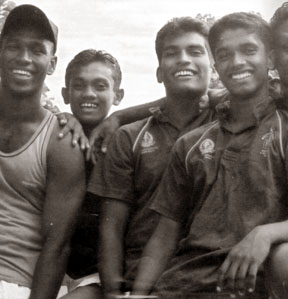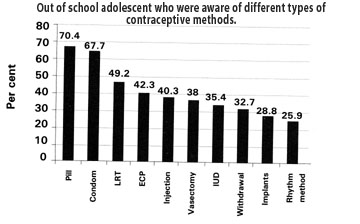|
observer |
|
|
|
|
|
OTHER LINKS |

|

|

|
|
Adolescence; problems and challenges: Engendering blockades of our generation
More than 91 per cent of adolescents opined that the family was a source of help for their problems. However, 84 per cent perceived that their friends would come forward to help them in case of an emergency and eighty-nine per cent said they were helpful to their friends. This clearly shows a considerable sense of social capital among out-of-school adolescents. Fifty-eight per cent of out-of-school adolescents viewed that their friends admire them and what they thought about them were important to 54% of the out-of-school adolescents while 79% thought that the community wanted them . All these trends indicate the existence of sound relations among adolescents. Smoking among out-of-school adolescentsIt is found that the percentage among non schooling adolescents both girls and boys who were exposed to smoking was 42% and 9 % respectively as the proportion of girls who are smoking was less than 1%.Of the out-of-school adolescent boys, 42% have smoked at least once, only 23% are current smokers, nearly 20% of which had smoked very recently. However, prevalence of smoking varies by ethnicity, education, socio-economic status and sectors. Highest prevalence was recorded among Sinhalese out-of-school adolescents while the lowest was among the Tamils. Knowledge of menstruation
However, there are many misconceptions related to the activities of daily living such as eating, bathing, and engaging in sports during menstruation. The responses to the statements given showed marked deficiencies in knowledge regarding the process of menstruation. Knowledge of conception was lower and that conception was possible as a result of the first sexual intercourse was known only to 46% of the respondents. Only 36% knew that there was a specific period in the menstrual cycle during which a woman can get pregnant, and just 17% could identify the fertile period correctly. More males than females were aware of the fertile period and could identify it correctly. Awareness of contraceptionThe most common known contraceptive method among out-of-school adolescents were pills (70%) and condoms (68%). The rhythm method and implants were least known (26% and 29% respectively). More males than females were aware of condoms, emergency contraceptives pills, vasectomy and natural family planning methods. Females were more aware than males of other methods such as pills, injection, IUD, implants and LRH. The most common methods of contraceptive that out-of-school adolescents used were the emergency pill (4%). Oral contraceptive pills were used only by about 2%; condoms and Depo-Provera injection were used by 2.8% and 2.7% respectively. Sexually transmitted diseases and HIV/AIDSHIV/AIDS was the most commonly known STD among out-of-school adolescents (82%). Gonorrhoea, the next most commonly known was identified by only 27%. Syphilis, herpes and genital warts were known to small proportions of the respondents. Intimate Relations and sexual behaviourAbout half the adolescents reported ever having a love affair, with 36% currently involved in an affair. Males reported a slightly higher prevalence of having ever had an affair compared to the girls. Among the main ethnic groups, the Sinhalese reported more love affairs which appeared to increase with rising educational and socio-economic status. The mean age for the first love affair was approximately 16 years for both boys and girls. Only 35% who are currently involved in affairs said they discussed matters related to sex. About 22% of the out-of-school adolescents admitted sexual experience, boys (28%) and girls (17%). Nine per cent reported having had a homosexual relationship (boys, 13% girls 6%). There were very little variations with regard to sexual experiences in relation to ethnicity, level of education or socio-economic status. However, sexual experience was highest among adolescents from the Colombo Metro sector while homosexuality was higher among other urban and estate sectors. More than half of the sexual encounters that had taken place among the out-of-school adolescents were with lovers. About 17% claimed to have had the experience with a friend, while 12% reported sex with commercial sex workers, highest per cent (34%) among the adolescent in Colombo Metro area. Only 39% of the sexually active non-schooling adolescents reported the use of condoms, more males (46%) than females (26%). Tamils had the highest use of condoms (46%) while the Sinhalese had the lowest (38%). Extremely higher rates of condom use was reported from North and East (92%), the lowest rates being among rural respondents (35%). Sexual abuseOne in ten persons among the out-of-school adolescents reported that they had been sexually molested. The proportion was more among the girls (12%) than among boys (8%). Moors reported more prevalence (17%) while Sinhalese had the lowest proportion (9%). With increasing education level and the socio-economic standards, a declining trend in the prevalence of abuse was observed. The highest proportion of sexual abuse was reported from adolescents in the other urban areas (12.4%).The lowest rate was from North and East sector (4.5%). (The work cited: "National Survey on Emerging Issues among adolescents in Sri Lanka" conducted by UNICEF) |
 Social capital is described as one's quality and quantity of social
involvement and potential support to be expected from society. Social
capital, on the other hand, indirectly reflects the quality of
interpersonal relationships and is also considered as one of the
important influencing factors on one's self-esteem.
Social capital is described as one's quality and quantity of social
involvement and potential support to be expected from society. Social
capital, on the other hand, indirectly reflects the quality of
interpersonal relationships and is also considered as one of the
important influencing factors on one's self-esteem.  The overall knowledge of menstruation among the adolescents was only
40% Girls (50%) had better overall knowledge on menstruation than boys
(32%). Among the Sinhalese those who were educated up to A/L and those
from the richest social economic quintile had the highest overall
knowledge on menstruation.
The overall knowledge of menstruation among the adolescents was only
40% Girls (50%) had better overall knowledge on menstruation than boys
(32%). Among the Sinhalese those who were educated up to A/L and those
from the richest social economic quintile had the highest overall
knowledge on menstruation. 








